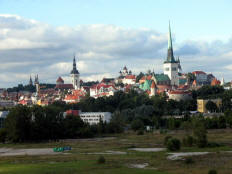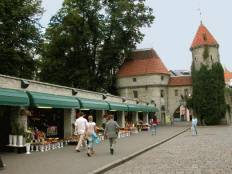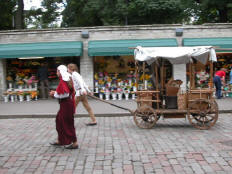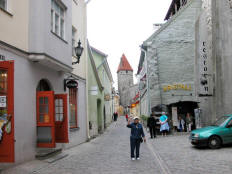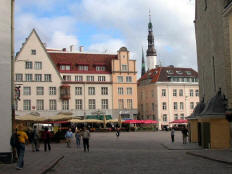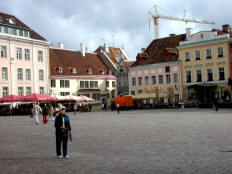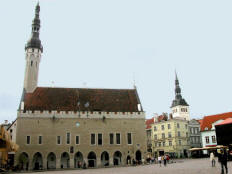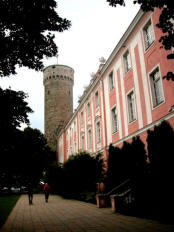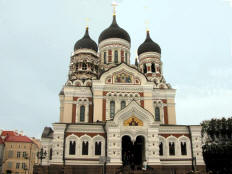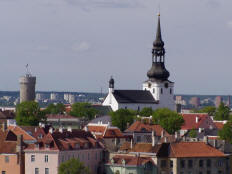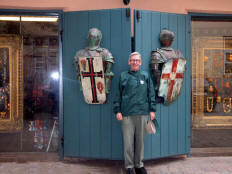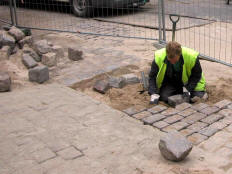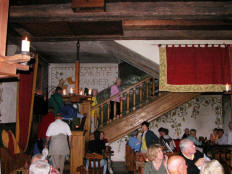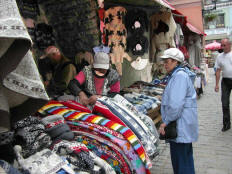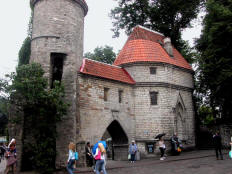Part II - Page 8 9 10 11 12 Go to: Part I Part III Part IV
TALLINN
Monday, 21August. The ship arrived in Tallinn, Estonia, at 7:45. Since we had plenty of time this morning, we had breakfast in the dining room for the first (and last) time on the cruise. The day was cool, but only partly cloudy, and I was able to get excellent photos of the city from the ship (including Fat Margaret, a large round fortification on the nearest corner of the city walls). Estonia has a very short history as a nation. After the Danes conquered the peoples of northern Estonia in 1219, German crusaders conquered the rest of Estonia in 1227. For seven centuries, the area’s peoples were subjugated by the Germans, the Poles, the Swedes, and finally the Russians. When Peter the Great defeated Sweden in 1721, he annexed Estonia (and Latvia) to Russia. Following the Russian Revolution, Estonia became independent in 1920. That lasted only 20 years. In 1940 the Soviet Red Army moved in and Estonia was incorporated into the Soviet Union. Nazi Germany occupied Estonia from 1941 to 1944, when it was retaken by the Red Army. With the breakup of the Soviet Union, Estonia and Latvia regained their independence in 1991. We had decided to see Tallinn on our own, without taking any of the excursions. We caught the shuttle at 9:15, passing right by Fat Margaret on the way. We were dropped off near the Viru Gate to the Lower Town a few minutes later. The entire block outside the gate was lined with flower shops.
There were very few people on the streets, almost no tourists. Apparently we had started earlier than most. Stalls selling sweaters and other knit goods lined the inside of the city walls (Wall of Sweaters). We didn’t want to carry packages while we toured the town, so we didn’t stop to shop. We continued on to a picturesque square with an old restaurant, the Olde Hansa, where we were offered the traditional bread of welcome outside. (The restaurant was not open yet.)
We continued up the hill past St. Nicholas (Niguliste) Church (13th century but much modified in 1820, destroyed in World War II and rebuilt), now a museum and concert hall. We stopped at the Tourist Office for a map. Then we walked to Raekoja Square, enclosed by medieval buildings, most notably the limestone Town Hall (1404 modification of late 13th century consistorio).
We went into one of the icon shops off the square (Kinga St.) to see what was available and to price them. Antique icons may not be taken out of Russia, but thousands of them have found their way to Tallinn where tourists are free to buy them and take them home. We saw some beautiful icons, many from the 16th and 17th centuries, but they cost upward of $2,000. I changed our remaining Swedish kroner into Estonian krone at a bank on the square, then we went back to the tourist Office to buy postcards. Although we didn’t realize it at the time, we were walking up Short Leg, the steeper pedestrian street, rather than the more gradual Long Leg that had been used by carriages. We struggled up the hill, through the city walls, and into the Upper Town. We saw the exterior of pink Toompea Palace, now home of the Estonian Parliament. Around the back was the old tower known as Tall Herman.
Just a couple blocks away, we visited the Toomkirik (Cathedral of the Virgin Mary), the oldest church in Tallinn (1233). We stopped in a shop along the way and bought a matryoshka doll for our youngest granddaughter.
We had read that there was a spot in the Upper Town that provided a great panoramic view of the Lower Town, and we soon found it. The view was spectacular, but by now the sky was completely cloudy and steadily growing darker.
We walked back into the Lower town on the Long Leg and turned into Raekoja Square. By now it was swarming with tourists. We went into the Town Hall Pharmacy (Raeapteek), that has been operating on this spot for more than six centuries. A small museum inside displays old apothecary jars, labeled in Latin, and other items from the past. We also stopped in another icon shop to look at some more antique icons. I found one made in "about 1660" that I really liked. Rather than a single scene, it had 12 smaller scenes surrounding a larger center scene, all intricately painted. However, the $3.600 price put me off. (I’ve since learned that this was a fantastic bargain.) Continuing back the way we’d come, we stopped at the Olde Hansa, now open. It was past 1:00 and we hadn’t eaten lunch, so we thought we might get something there. It was very crowded, though. We saw a group leaving and managed to get their table for four. Jane went to the bathroom while I looked over the menu. After a while, a party of four Germans asked if two of them could sit opposite me. The other two found a nearby table for two. I offered to let them have the large table, and I moved to the other one. I waited at least 15 minutes, but no waitress came by. And neither did Jane. I was concerned that, when she saw I was no longer at the table where she left me, she might have gone outside. Eventually, though, she appeared. Her visit to the ladies’ room had been an adventure of its own. By this time, we concluded that we might never be served, so we left the Olde Hansa. Fortunately, Jane was able to get an ice cream cone a few minutes later. By now a light rain was falling. We stopped at the Wall of Sweaters that we’d passed on the way in, and Jane bought a wool sweater.
Part II - Page 8 9 10 11 12 Go to: Part I Part III Part IV |



